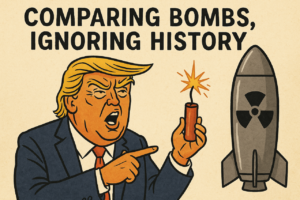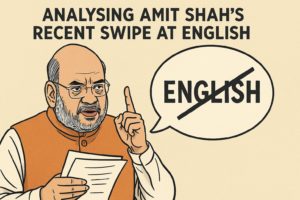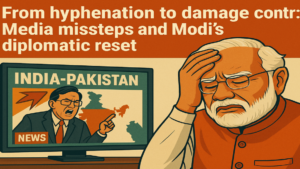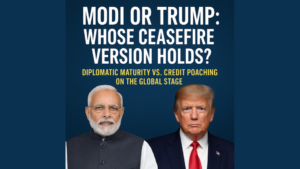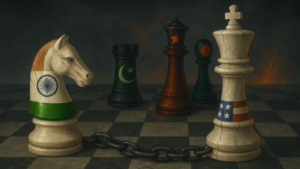Last week, Trump Compared Bunker Busters to Atom Bombs. That’s like comparing: Firing your apprentice to decimating a civilization! The MOAB (Mother of All Bombs) may be America’s biggest non-nuclear bomb, but it doesn’t come with the generational radiation, surrender of nations, or the rewriting of world history. The illusion here is not just technical, it’s historical and moral. Hiroshima and Nagasaki weren’t just military events - they were civilizational inflection points, forcing … [Read more...] about Flattening Historical Nuance Flattens Truth: Trump’s Bomb Analogy
Political
Analysing Amit Shah’s Recent Swipe at English
Amit Shah was not just defending his son’s English… The direction in which the BJP government has been moving - with its strong cultural and political assertion - had made it seem that, in time, while English might continue to be the language of the self-proclaimed elite, Hindi would increasingly become the language of the power elite. But this linguistic transition now faces headwinds. Globally, the world is tilting back toward a “might is right” mindset - and here, English still … [Read more...] about Analysing Amit Shah’s Recent Swipe at English
Defence and Aerospace Marketing in the New Multipolar Arms Bazaar
The B-2 Bomber just flew a PR mission as much as a military one. Defence marketing has a long but largely undocumented history. Until the 17th century, colonial powers maintained a tacit agreement not to arm their subject states, lest the weapons spark rebellion. While arms were supplied covertly, the lack of formal records-other than the accounts of war enthusiasts-has left the field historically fuzzy and fragmented. By glorifying the B2 stealth bomber’s precision and majesty, the US … [Read more...] about Defence and Aerospace Marketing in the New Multipolar Arms Bazaar
From Hyphenation to Damage Control: Media Missteps and Modi’s Diplomatic Reset
For years, Indian foreign policy has sought to de-hyphenate itself from Pakistan—to be viewed not as one half of a regional rivalry, but as a rising global power in its own right. Yet in a bitter twist of irony, it wasn't Pakistani propaganda or foreign policy that reinserted the hyphen—it was mostly India's own electronic media. When tensions with Pakistan escalated in early 2025, the Line of Control wasn’t the only frontier that lit up. Inside air-conditioned studios outfitted with green … [Read more...] about From Hyphenation to Damage Control: Media Missteps and Modi’s Diplomatic Reset
Modi or Trump: Whose Ceasefire Version Holds?
Diplomatic Maturity vs. Credit Poaching on the Global Stage The recent ceasefire between India and Pakistan has once again brought into focus the delicate game of global perception, and how leaders position themselves before domestic and international audiences. On Truth Social, former U.S. President Donald Trump was quick to claim credit, rushing to announce victory like a glory hungry contender at the podium eager to declare victory even before the microphones are unwrapped. (Those who know … [Read more...] about Modi or Trump: Whose Ceasefire Version Holds?
Decoding the Signals: Insights into this week’s Pakistan-US Dynamics
In the aftermath of the Pahalgam massacre, Pakistan’s Defence Minister Khawaja Asif delivered a statement loaded with strategic signaling. He accused the United States & the United Kingdom of playing a very negative role, charging them with promoting terrorism through Pakistan and hobnobbing with terrorists for three decades. Through this broadside, Islamabad signaled a sharp pivot: retaliating against American criticism and abandonment by firmly closing the door on the U.S. and instead … [Read more...] about Decoding the Signals: Insights into this week’s Pakistan-US Dynamics
